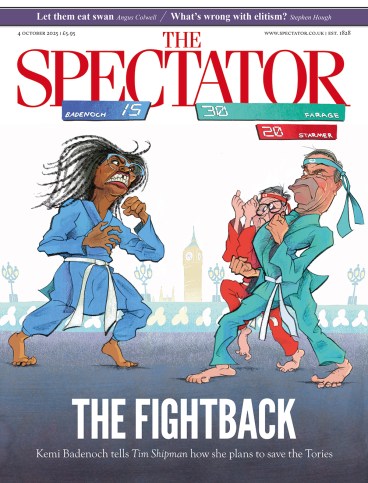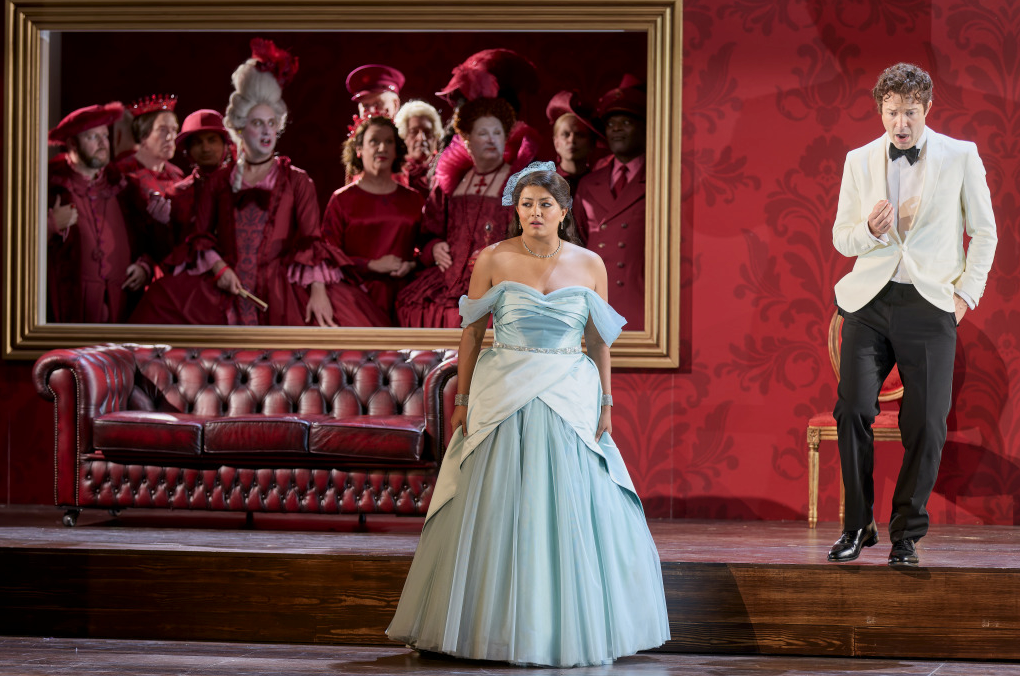
‘Goodness Triumphant’ is the alternative title of Rossini’s La Cenerentola, and you’d better believe he meant it. Possibly my reaction was coloured by last week’s experience with the weapons-grade cynicism of Stephen Sondheim’s Follies, but honestly – it’s just so sweet. A gentle, put-upon girl gets her fairy-tale ending in the face of stepsisters and a stepfather who are basically buffoons rather than outright villains. We’re in the realm of panto, or children’s TV: nothing really dark can happen here and the only sorcery is worked by Rossini, whose fountain of laughing, crystal-bright invention is as life-affirming as Haydn, if he’d been born 50 years later and in Italy.
Pure feelgood, then, for kids of all ages. You can see why a new La Cenerentola (as Cinderella) must have seemed like a good way to open English National Opera’s season at the Coliseum (watch this space for details of ENO’s upcoming, Arts Council-enforced Manchester side project). Despite its occasional misfires, ENO’s long-established policy of positioning itself as a sort of London Volksoper – the playful, accessible West End alternative to the Royal Opera – is basically a sound one, and Julia Burbach’s colourful and glitzy updating doesn’t shirk its responsibility to entertain.
This being the Coliseum, that means filling the stage with activity: always tricky in that hangar of a theatre, and doubly difficult when so much of Rossini’s ensemble energy comes from precision and speed. Don Magnifico (Simon Bailey) and his daughters live in a blingy celebrity crib complete with spiral staircase and a lift (handy for sudden changes and surprise entrances). There’s always something happening. There are dancers, revolving bookcases and a whole troupe of children dressed as mice, who keep things lively and generally ramp up the cute-quotient – which hurtles off the scale when Bailey is joined on stage by a winking, mischievous infant Mini-Me. A canny move at the end of a long opera.
There’s a lot of amusing detail like that, and Sussie Juhlin-Wallen’s costume designs were particularly fun. A Ruddigore-style chorus of ancestors, dressed for their respective eras, step out of their picture frames to strike Regency attitudes or practise their golf swing. Dandini (Charles Rice, splendidly louche) conducts a one-man cocktail masterclass while the denouement unfolds. By and large, Burbach and her cast kept their comedic plates spinning, though as ever in the Coliseum there are spots on stage where with the best enunciation in the world (and Bailey led the pack here) the words become inaudible. Christopher Cowell’s new English translation has its moments (‘Get a wiggle on!’) but one of the pivotal scenes – when the newly royal Cinders begs her stepfather to call her ‘daughter’ – didn’t clutch at the heart as it sometimes can.
Still, this was an entertaining night, and the singing and conducting (Yi-Chen Lin, agile as well as stylish) were enjoyable. There’s a juicy Alidoro (David Ireland), and an engaging, sunny-sounding Prince Ramiro (Aaron Godfrey-Mayes) as well as Rice’s lounge-lizard Dandini. In this opera, you shouldn’t really dislike anyone, and the two sisters (Isabelle Peters and Grace Durham) are very funny, by turns feline and forward. But without a really loveable Cinderella it’s all just fizz, and the best way to appreciate the magnetism of the Canadian mezzo Deepa Johnny is to experience it for yourself. Her voice is as translucent as it is warm. Even her coloratura sounds tender and her acting looks and feels so natural – so touching– that you could almost believe in fairy tales. Cinderella is an opera with a big heart and with Johnny in the title role, you can feel it skip beats.
In Manchester, the Hallé began its second season under its new principal conductor Kahchun Wong with a programme of Shostakovich, Elgar and Rachmaninov. Wong has been well received, but I’m still struggling to get a handle on his musical personality. Certainly, he was a sensitive accompanist in Elgar’s Cello Concerto, spreading watercolour tints behind the soloist Rachel Helleur-Simcock: the orchestra’s recently appointed principal cello, making her debut under the fiercest possible spotlight (the advertised soloist, Truls Mork, being indisposed). Understandably, she sounded cautious, but her tone – firm and walnut-hued – was lovely.
After the interval, Wong conducted the world’s slowest performance of Rachmaninov’s Second Symphony. The Hallé strings are premium silk-plush; the famous clarinet solo (played by Sergio Castello Lopez) practically melted on the tongue. But Wong’s gooey, near-static first movement handed ammunition to those (they still exist, incredibly) who view this noble symphony as an over-stuffed plum pudding.
I adore the piece – had been looking forward to it all week – and in fairness it bucked up a bit after the scherzo. But CrossCountry Trains wait for no critic and as Wong’s interpretation entered its second hour there was no option but to head for the door.







Comments